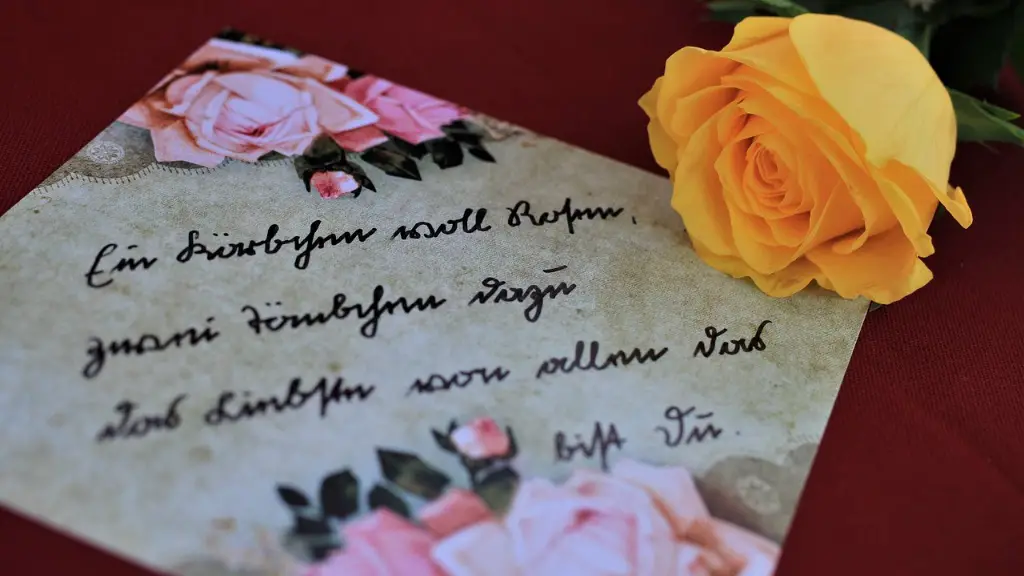Poetry is a form of language that communicates one’s feelings and emotions more deeply than ordinary language. It works its way into our hearts and minds, sparkling our imaginations with beautiful lyrics that have lasting effects on the heart and soul.For many, hearing the word ‘poetry’ conjures up images of rhyme and meter, tightly structured and formalized; the works of the great poets: Longfellow, Emerson, Keats, Frost and many others. However, poetry does not always come in this grandiose style. It can also be expressed in images, a song, a poem or a story.
In its simplest form, poetry is a way of conveying feelings and emotions through words, imagery and sound. It can be used to express love, longing, sorrow, joy, regret, anger and many other human emotions. It is a way to convey the human experience in a simple and powerful way that may never be possible through average conversation. Poetry can be used to help understand the world and its events, to explore alternative ideas and to express thoughts, passions and desires. It can be used to make an audience feel or encounter a new feeling, to change opinions and create dialogue.
In the words of poet and philosopher Percy Shelley, “poetry lifts the veil from the hidden beauty of the world.” By using words to direct the flow of the mind’s eye, the poet can artistically construct a new reality, one that can offer insight, hope, and healing, while strengthening senses of community and empathy. For many of us, poetry resonates with our innermost feelings and thoughts in a way that other forms of expression cannot.
The English poet and critic, T.S. Eliot spoke so profoundly about poetry and the vital role it plays: “Genuine poetry can communicate before it is understood.” The power of poetry is its ability to communicate and create a meaningful relationship between the poem and the reader, regardless of any language barrier. Every language has its own unique way of expressing feelings and emotions, and the knowledge and understanding of each other’s culture, language and poetry is essential for a rich and meaningful relationship between two people or groups of people from different cultural and linguistic backgrounds.
Poetry can be used as a tool to explore our emotions, resolve conflicts and provide comfort and solace during difficult times. The words can heal wounds and provide a way to express ourselves even when external forces are preventing us from doing so. For many of us, poetry is a lifeline, where words and images can connect us to our innermost feelings and thoughts.
There is no right or wrong way of expressing oneself through poetry, regardless of your language or culture. Poets have the freedom to explore and express their innermost feelings and thoughts without fear of judgement or criticism. This freedom encourages the poet to compose their work in the way that best communicates their emotions and feelings.
Creating Meaningful Relationships Through Poetry
Poetry sheds light on how communication and relationship building is vitally important in our society. Through poetry, people are able to express themselves and their emotions in a way that is meaningful, honest and personal. Poems can be seen as a bridge between people of different cultures, beliefs and backgrounds and can be used to create a greater knowledge about each other. For example, the poem ‘We Who are Different’ by Czeslaw Milosz can be used to connect individuals from different backgrounds, to build trust and empathy across culture and language.
Poetry can also be an effective way to articulate and express emotions related to difficult life experiences. One example is the poem ‘Your Strong Arms’ by Emily Keeler which conveys the pain, turmoil and resilience associated with surviving domestic violence and finding strength in the arms of a loved one. Poetry such as this brings to light the issues of domestic violence, while also providing hope and comfort to those experiencing it.
Cultivating Emotional Resilience Through Poetry
Poetry can provide an outlet for emotional expression which can be helpful for cultivating emotional resilience. Psychologists Craske and Matsikas suggest that emotional resilience is achieved through ‘transforming emotional experience into an emotional language’, which can provide a more meaningful way of understanding and communicating emotional difficulties. Poetry works by providing an individual with a creative way of expressing their feelings, which can help to reduce stress and distress. It can also be used as an effective way to validate feelings of anger, sadness, joy or loneliness and can help people deal with grief and the loss of loved ones.
In addition, poems can be used in various therapeutic settings such as art therapy, cognitive behavioral therapy and psychotherapy, to help individuals gain insight, increase self-awareness, and help cope with difficult emotions and life events. Evidence has also been found to suggest that poetry can help build resilience in individuals by providing hope and comfort.
Connection Through Imagery and Sound
Poetry is more than just words; it utilizes imagery and sound to evoke emotion. The poet can use words to create visual images to paint a vivid picture for their reader, providing a deeper level of understanding for the reader. The flow of the poem can be further enhanced by the use of sounds such as onomatopoeia, alliteration and assonance, which can create an additional layer of emotion that can be felt by the reader.
Sounds can also be used to help create a mood or atmosphere, providing the reader with an immersive experience. For example, in the poem ‘Sea Surprise’ by Lee Bennett Hopkins, the poet utilizes the sound of crashing waves and the scent of saltwater to evoke a feeling of joy and happiness in the reader.
Healing and Growth Through Poetry
The power of poetry lies in its ability to heal and provide comfort to those who feel unheard and misunderstood. Through its use of expressions, imagery and sound, poetry can provide a safe and creative space for individuals to explore and express their emotions, while providing the opportunity for healing and growth. It can help an individual to better understand and validate their own feelings and emotions and in turn, help them form a connection with others.
Evidence suggests that poetry can be an effective form of self-care, helping to reduce stress and symptoms of depression. It can provide a space for self-reflection, thought-exploration and creative expression in a non-judgemental way, allowing an individual to express their authentic self.
Poetry In Education
Poetry can also be used as a tool in education, to help students understand and engage with material more thoroughly. Poetry can be used in the classroom to help students express their own ideas and opinions on a given topic, or to explore and understand other cultures and histories. Poetry can help students to further their knowledge on a specific subject, while also refining their writing and speaking skills.
It can also be used as a means of teaching empathy and understanding; by demonstrating how language can be used to express feelings, thoughts and experiences. This can help students to relate better with their peers

